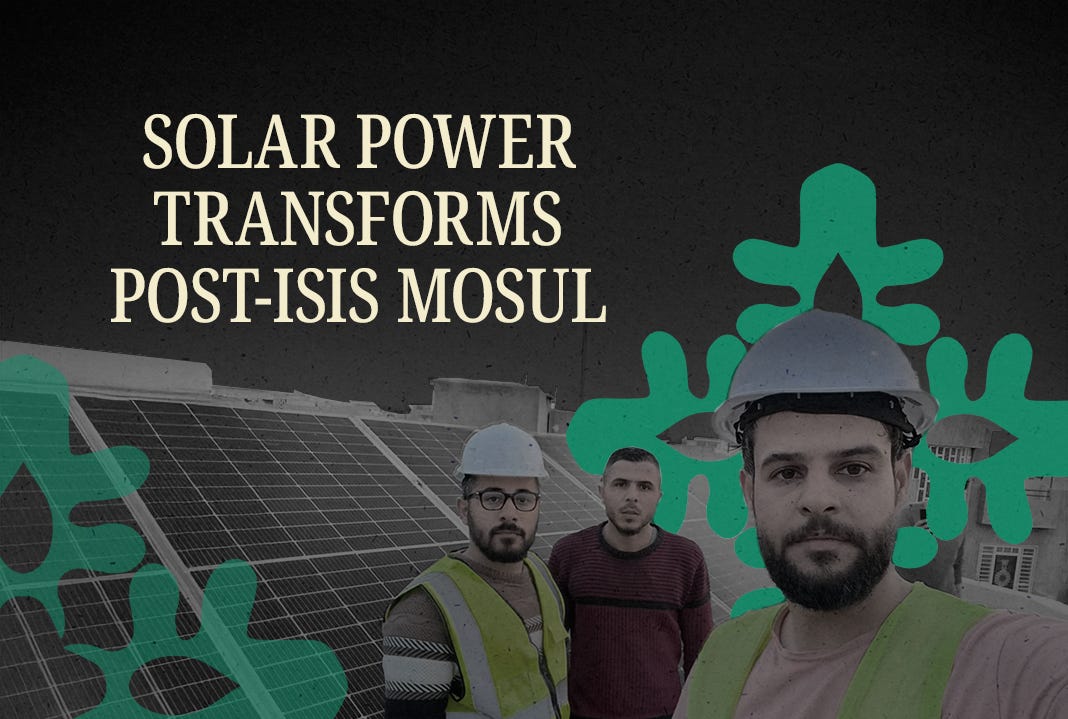Solar Power Transforms Post-ISIS Mosul
Mosul’s residents are ditching diesel generators and investing in rooftop solar to survive brutal summers and chronic outages
In 2017, Mustafa Almola returned to a home devastated by conflict. The nine-month battle to expel ISIS from Mosul had left the old city—the historic quarter on the western banks of the Tigris—in ruins. What was once a bustling warren of backstreets and busy thoroughfares, where stone houses opened into courtyards and ancient mosques shared the street with medieval churches, was now rubble.
Looking at the jagged frames of buildings that once housed the city’s most vibrant and diverse community—a place where Muslims, Christians, and Jews lived side by side—Almola wondered what could possibly be salvaged for the future. “I felt hopeless, as if life was about to end, but then I gathered myself up and decided to try and create change,” he says.
A student of renewable energy, he saw an opportunity to improve standards of living by tackling the city's longstanding energy crisis. His plan would provide something unthinkable—a sustainable energy supply to end the power outages that made life miserable during the summer.
Like other parts of Iraq, Mosul suffers from severe energy shortages, forcing residents to endure daily blackouts year-round. A large gap between energy supply and demand is exacerbated by ailing infrastructure that affects the rich and the poor alike.
People are forced to use expensive private generators that choke the streets with black smoke. But the voltage is often too low for air conditioning and larger appliances. Tired of this haphazard supply, many Iraqis are turning away from the national grid and harnessing a resource the city has in abundance: solar power.
Abdel Majid, a university lecturer who lives in the city, used to dread the summer months. “I would come back home and instead of relaxing after a long day at work, I would be burning on the sofa or on the bed, unable to rest or sleep. I was always tired,” the 28-year-old said.
Observing the new trend towards solar panels, he bought some, spending around $2,200 USD, to regain control of his life. “I feel like a human again. I can sleep and rest. It has changed everything,” he said.
Despite vast oil reserves that should make it one of the most energy-rich countries in the world, Iraq depends on gas and electricity imports to meet its energy demands. The shortfall is significant—around 20,550 megawatts, or 42 percent, according to Iraqi Prime Minister Shia Al Sudani, speaking at the Iraq Development Platform Conference in Baghdad earlier this year.
The Prime Minister has made it a cornerstone of his premiership to move the country towards energy independence and develop the sector. However, internal political challenges, regional disputes, and international pressures have contributed to uncertainty and delays.
With structural changes slow to take shape, the private sector is stepping in to meet mounting demand. Longstanding energy challenges that consecutive governments have failed to address are easing as solar panels pop up on rooftops across Iraq.
“People are happy with solar power. The units really improve the quality of life. With fewer generators around, the air is cleaner, the electricity bill is smaller, and people are able to withstand the summer,” Almola says.
The energy problem is particularly acute in Mosul, where much of the infrastructure was destroyed during the battle to expel ISIS. With power plants damaged and transmission lines down, residents endure sweltering summers of up to 50 degrees Celsius without respite.
Food spoils as fridges run warm and tempers fray in the relentless heat. Many Iraqis are now turning away from government-provided power and relying entirely on solar panels. “Anyone can do it, you just remove the power metre and that’s it, you’re off the grid,” Almola says.
The 30-year-old launched his company Megawatt Solar in 2021 in the early days of the city’s solar-power boom. Since then, the sector has mushroomed, with his orders leaping from an average three installations per month to three a day.
Costs have dropped too, from around $200 per panel four years ago to $90 today, making the technology accessible to a much wider audience. “As soon as you enter Mosul you see solar panels everywhere,” says Almola, who recently installed a system in a nearby village where all 56 houses now have solar panels.
Last month, Iraq’s Central Bank announced a new initiative to offer low-interest loans for people and businesses to install solar panels. Almola is now anticipating a surge in demand for solar panels as more Iraqis pay for a reliable solar supply and ditch the patchy generators.
In smaller houses, people are making space by any means necessary to install solar equipment. One client even put it in the guest living room. “He said the kit was more valuable than the guests,” Almola says. “In Iraq, AC is a means of survival.”
However, the rapid growth in renewables has left the sector unregulated, creating issues for certified suppliers. “There are people selling solar panel systems who are not qualified, causing problems for the customers who are losing confidence,” says Almola.
Despite the rapid rise in orders, his profit margins have shrunk. He believes a lack of market control is to blame. With new incentives likely to fuel demand, he hopes better regulation will follow to ensure sustainable growth in the sector and power an era of prosperity for Mosul as the city rebuilds.
Mosul’s solar boom isn’t just a response to failing infrastructure—it’s a reflection of people taking control where institutions have long fallen short. In the absence of lasting reforms, residents like Almola are building practical solutions with lasting impact, proving that recovery, for now, rests in the hands of those willing to act.
Middle East Uncovered is powered by Ideas Beyond Borders. The views expressed in Middle East Uncovered are those of the authors and do not necessarily reflect the views of Ideas Beyond Borders.



